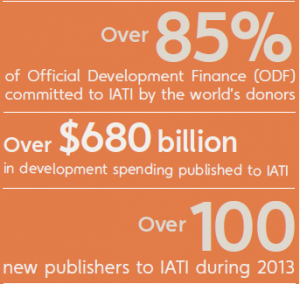New in the aid transparency game: 4 things I’ve learned
It is almost two months since I started working at Publish What You Fund. The intensity of my induction has been proportionate to the level of expertise the organisation has accumulated since it was founded – and that is significant!
 My first weeks started with our Aid Transparency Index (ATI) being cited multiple times by U.S. pundits and congressmen debating the destiny of the country’s budget for the next fiscal year, pushing for progress in transparency of foreign assistance.
My first weeks started with our Aid Transparency Index (ATI) being cited multiple times by U.S. pundits and congressmen debating the destiny of the country’s budget for the next fiscal year, pushing for progress in transparency of foreign assistance.
Also in my first few weeks, the French government developed an interactive tool to map its aid flows to Mali, and South Korea announced its plans to join International Aid Transparency Initiative by the end of 2015.
All of this progress is remarkable for an organisation that is just over five years old! So given I’ve had such a swift induction, here is what I’ve learned so far:
- The modern world deals with lots of information. Although technology and the internet have made things easier, there are still two ways of hiding information (intentional or not) by not making it accessible or usable.
- Transparency does not do the trick if we need a bunch of people digging into hundreds of reports and evaluation documents. Decision-makers can’t wait and organisations or citizens interested in getting institutions accountable would need to spend significant resources to do this.
- Transparency is more than just making reports available on a website or copy-pasting links on a reporting template or even manually mapping this information. It is also about making information public in a way that can be tracked, compared and analysed in a reasonably quick amount of time; and understood by multiple audiences.
- Throughout the years there has been an important collective effort to give transparency in development cooperation, a tool to make all the good things we say about transparency, happen. This effort has given life to the IATI Standard, a multi-stakeholder initiative that was also recognised within the commitments of the 4th High Level Forum on Aid Effectiveness in Busan 2011.
The past few years, I’ve been engaged with international processes on sustainable development including advocating for an international framework on corporate transparency and accountability. I am very thankful to the people I’ve worked with on this. Our issues are not different.
At Publish What You Fund, we are engaging in collective work to look for ways to align donor country development flows with national budgets of partner countries through the IATI Technical Group (heads up: there’s no need to have multiple reporting systems!).
Progress has been encouraging for such a young initiative (it’s only been up and running since 2012). However, it hasn’t achieved its full potential yet. Much more needs to be done on:
- Getting more development providers publish information of development flows through IATI.
- Improving the quality of information it’s published, in a way that is meaningful to partner countries and citizens who should benefit from development cooperation.
- Encouraging the development of user friendly (and importantly: citizen friendly) tools to be used nationally/locally.
- Promoting dialogue with other platforms and initiatives so we are ready to share information, lessons learned and generate innovation.
- Better communicating that words like ‘the data revolution’, ‘machine-readable’, and ‘XML language’ should not be exclusive/excluding.
Transparency is the first building block of any effort to make change happen. Meaningful information means better decisions and better oversight of activities that are meant to (directly or indirectly) provide a public good.
With so many international development discussions happening and the Busan implementation deadline in 2015 around the corner. These are truly exciting times to join an exciting movement!

